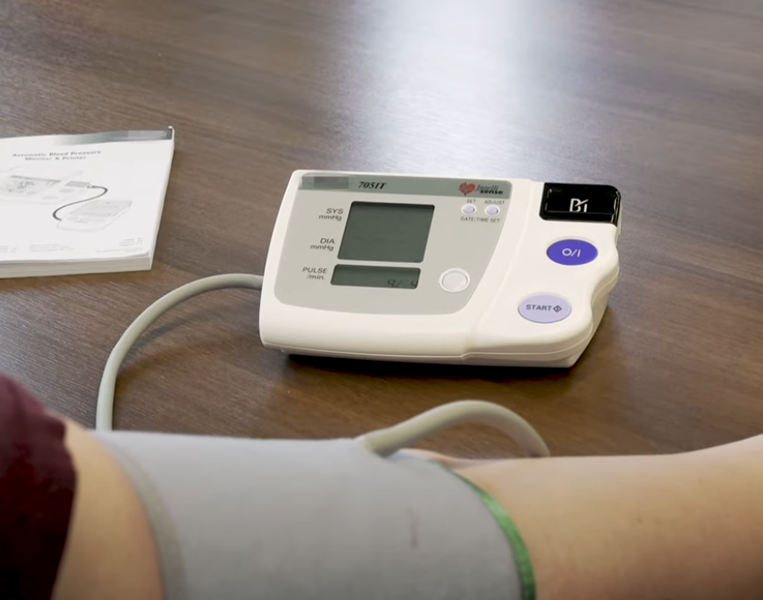Low blood pressure
Low blood pressure, is when blood pressure is lower than it should be. While it doesn't always cause symptoms, it can lead to dizziness and feeling lightheaded.
What's on this page?
- What is low blood pressure?
- What are the signs and symptoms of low blood pressure?
- What causes low blood pressure?
- Treatment of low blood pressure
- Heart helpline and other support
What is low blood pressure?
Low blood pressure, also known as hypotension, is when your blood pressure is below 90/60mmHg. This does not necessarily mean that there is a problem, but you might need treatment if it is causing symptoms.
Watch this video to learn how to measure your blood pressure at home.

What are the signs and symptoms of low blood pressure?
Most people with low blood pressure do not have any noticeable symptoms. However, in some people, it can cause;- lightheadedness or dizziness
- feeling sick
- feeling tired
- blurred or fading vision
- generally feeling weak
- confusion
- fainting.
If you experience any of these signs and symptoms, speak to your doctor.
What causes low blood pressure?
Some of the things that can cause low blood pressure include;
- Getting older; some people develop low blood pressure as they get older.
- Medicines including some heart medicines, high blood pressure medicines and water pills (or diuretics). Medicines for Parkinson's disease and erectile disfunction increase the risk of orthostatic hypotension (this is a type of low blood pressure that happens when you move suddenly).
- Health conditions; low blood pressure can be a symptom of conditions like Parkinson's disease, diabetes and other heart conditions.
- Blood loss; losing a lot of blood from an injury or internal bleeding reduces blood volume leading to a severe drop in blood pressure.
- Pregnancy; blood vessels can expand in the first stages of pregnancy. This causes blood pressure to drop. After giving birth, blood pressure should go back to how it was before pregnancy.
- Heart conditions; conditions that affect how your heart works can affect your blood pressure. These include heart failure, some arrhythmias, including bradycardia (or low heart rate).
- Endocrine disorders; these are conditions that affect hormone producing glands. Some hormones like cortisol help to regulate blood pressure. If you do not make enough of them, your blood pressure can drop.
- Dehydration; when your body does not have enough water, there is less blood travelling around the body. This can lead to low blood pressure.
Treatment of low blood pressure
If low blood pressure is caused by something else, it is treated by managing the cause. For example, stopping bleeding in case of an injury or drinking more water if you are dehydrated.
You can also do some things at home to help with your signs and symptoms. Below are some of the things that you can try;
- Getting up slowly from your bed or sofa.
- Avoid staying still for too long. You can cross and uncross your legs or try a standing or walking desk.
- Drink more fluids. If you are on a daily fluid restriction due to your heart condition, check with your doctor how much fluid you can drink.
- Exercise regularly. You can start by moving more in your day, for example, try taking the stairs instead of the lift or try a simple home workout.
- Ask your doctor about adding more salt to your diet.
- Eating smaller meals more often throughout the day.
- Wearing support stockings. This can improve circulation and increase blood pressure but check if this is suitable for you with your doctor first.
Speak to your doctor before making any changes to your lifestyle, diet or exercise routine to make sure you stay well.
Heart helpline & other support:
- Speak to our cardiac nurses by phone, callback, email or online chat on Heart Helpline (Monday to Friday, 9am to 5pm).
- Contact us to talk to our customer care advisors, find your local BHF shop and for any comments, compliments and complaints you may have
- Sign up to our Heart Matters magazine for online information packed with health and lifestyle advice.
- Join our HealthUnlocked community to share experiences, ask questions and support one another if you're affected by heart and circulatory conditions.

You can trust our health information
We've followed an eight-step process to make sure this content is reliable, accurate and trustworthy.
Learn how we make our health content.


